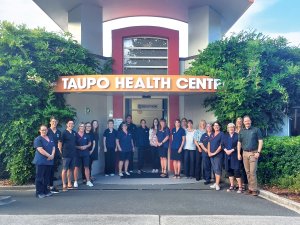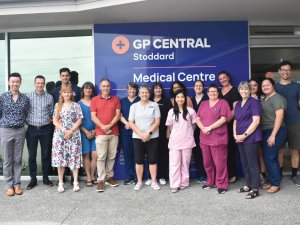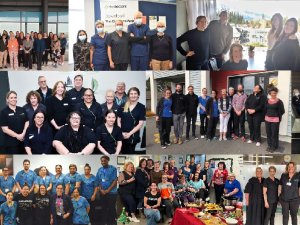Respiratory physician Lutz Beckert considers chronic obstructive pulmonary disease management, including the prevention of COPD, the importance of smoking cessation and pulmonary rehabilitation, and the lifesaving potential of addressing treatable traits. He also discusses the logic of inhaler therapy, moving from single therapy to dual and triple therapy when indicated, as well as other aspects of management
Team-based care changing the game in GP-stretched Taranaki
Team-based care changing the game in GP-stretched Taranaki

GP owners with ‘skin in the game’ expand rural care model through a dedicated team with strong community connections. Zahra Shahtahmasebi reports
If the last few years have taught specialist GP Nick Loveridge-Easther anything, it’s that general practices are prepared to put up with a lot.
The rural GP and co-owner of Taranaki company Coastal Medical, which owns three practices in Ōakura, Ōpunake and most recently Avon Medical in Stratford, says his colleagues are frequently going above and beyond to ensure their communities get the services they need.
“That’s the reality for rural general practice...we’re the last option...We constantly put up with huge pressures because of our underlying motivations, but this risks the goals we’re trying to achieve,” Dr Loveridge-Easther says.
But the new model of care being worked on by Coastal Medical is helping bring change to Taranaki, he says, a region that has long suffered from the impacts of New Zealand’s GP shortage.
Coastal Medical took over ownership of Stratford’s Avon Medical Centre in 2022, after three GPs left, leaving one doctor locally and one virtually to service its 7500 patients.
The situation was quickly becoming unsustainable, says Dr Loveridge-Easther. Coastal Medical already owned the coastal Ōakura and Ōpunake Medical Centre on the other side of Mt Taranaki and saw an opportunity to create a better environment for both staff and patients in Stratford.
“Pinnacle [the PHO] was struggling with Avon Medical, providing locums for them and we saw we could take some control and address the staff shortages.”
Of the coastal practices, Ōakura is the oldest, started by specialist GP Brent Anderson in the 1980s as a solo GP. Ōpunake followed in the early 2000s. Dr Anderson remains as a specialist GP and a co-owner of Coastal Medical alongside Dr Loveridge-Easther and one other specialist GP,
Shaun Butler.
“Our view is that our owners need to be working in the system, they need to have buy-in and skin in the game to invest in the quality of product we’re producing,” says Dr Loveridge-Easther.
Their driving force is to try to modernise systems, so the practices remain viable in New Zealand’s tough primary care climate. The leadership team has been creating systems that are universal across the network of practices, to improve efficiencies, minimise repeating or duplicating work, and ultimately reduce the load on individual clinics. “So there’s structure, accountability, transparency for all staff and we can achieve the goals we want to achieve while ensuring sustainability,” says Dr Loveridge-Easther, who came on board with Coastal Medical five years ago.
The new model of care sees the whole practice team being utilised to distribute workloads more evenly and relieve monotonous pressures from the GPs, who now work across the network of clinics in a consultant role, he adds.
“We’ve established a phone tree, which allows for triage and allocation, an acute care service, and have a proactive care approach to long-term conditions and immunisations.”
Practice after hours is run through PHO-funded service, Practice Plus and Whakarongorau Aotearoa. The three GP directors share the call loads to allow a balanced lifestyle for the other employees, where calls come through about 50 per cent of the time.
“There’s big pressures on rural general practice. You have to be available because there are no other options,” says Dr Loveridge-Easther.
Based on their location, distance away from main centre, New Plymouth and their populations, all three practices meet the criteria for being rural. Together they serve a patient base of just under 20,000.
About 20 per cent of the communities in both Ōakura and Ōpunake identify as Māori and the rest are predominantly Pākehā.
There’s a vast array of socioeconomic status – many are manual labourers working for the farmers in the area.
For those on the lower-end of the socioeconomic spectrum, Dr Loveridge-Easther says they present at the medical centres very late in terms of pathology.
“Health is not their first priority, they don’t have a lot of disposable income.”
Travel to and from the clinics is a massive barrier, which also feeds into the late presentations. Those working on farms, often have no one to replace them when they take time away.
Secondary care access is a further issue. Ōakura is the closest to Taranaki Base Hospital at 15 minutes’ drive away, but from Ōpunake that extends to 48 minutes and from Stratford 34 minutes on open roads.
“Any of the barriers you can think of for patients is accelerated in rural,” Dr Loveridge-Easther adds.
The lion’s share of the work tends to be chronic diseases; the likes of heart disease and chronic obstructive pulmonary disease, he says, adding that the new model of care has also been working hard to manage the higher burden brought on by acute injuries.
“Each clinic has people focusing on acute care, someone on chronic conditions to minimise that disruption, which is just not possible for other rural locations.”
As Dr Loveridge-Easther identifies, no GP is motivated by financial gain, instead it’s the relationship building with patients that’s his and his colleagues’ favourite part.
“You see them and their family...You maintain contact for a long period of time, and it’s an honour to improve care and quality of life.”
If there’s one point Dr Loveridge-Easther makes repeatedly, it’s how in awe he is of the team he works with.
“The dedication of staff on the ground, they’ve put up with a lot of change – new systems and PMS. I’m proud of how the team put up with so much stress with goodwill and grace...they come in with a smile.”
They were willing to take on the challenge of moving to a teams-based model of care, and it’s already showing results, feeling more sustainable, allowing practitioners to step up and achieve their potential, as well as allowing the clinics to have increased access to the community.
One of the biggest challenges in having multiple practices has been communication across the team. As a result, Dr Loveridge-Easther says strong communication and clear transparent systems have become key values for Coastal Medical.
As well as being highly tolerant of all of the changes in the last couple of years, he also describes the team as all being dedicated and capable across the board.
“They live and work in the community and come to work for their people.” And it’s that knowledge they glean from being local that is critical: “They’ll hear about things and can initiate care earlier – they’re changing outcomes.”
Contrary to the norm for rural practices, Dr Loveridge-Easther says Coastal Medical has a younger bunch of GPs, which is providing reassurance around long-term stability.
Ōakura, the wealthiest of the three towns, located on the coast on the edge of New Plymouth, is a particularly attractive place to live: “Good lifestyle and place to raise a family, with plenty of interesting rural medicine.”
Coastal Medical is lucky to be well staffed, he says, but in spite of this, they can’t afford to not be constantly recruiting for more. “The propensity of small clinics to be dependent on one or two staff means they’re at risk of collapse. Overstaffing costs more to run but otherwise you’re in a bad position.”
Highly skilled specialist GPs, with whom the buck stops, are becoming increasingly hard to come by, he adds, but they need to remain a priority to avoid general practice becoming fragmented.
“Nurse practitioners and extended care paramedics remain critically important and wonderful additions to the team, but are not replacements for GPs,” Dr Loveridge-Easther says.
Zahra Shahtahmasebi is an Auckland journalist
- Locations: Ōakura Medical Centre, 1149 South Road, Ōakura; Ōpunake Medical Centre, 26 Napier Street, Ōpunake; Avon Medical Centre, 8 Romeo Street, Stratford
- PHO: Pinnacle Midlands Health Network
- Staff: 92, including reception and administrative staff
- Owner: Three GPs
- Enrolled patients: Just under 20,000
- Funding: Capitation, rural
TELL US WHAT YOU THINK
You can add your comments using the comment function below, or by sending a Letter to the Editor to editor@nzdoctor.co.nz










![Barbara Fountain, editor of New Zealand Doctor Rata Aotearoa, and Paul Hutchison, GP and senior medical clinician at Tāmaki Health [Image: Simon Maude]](/sites/default/files/styles/thumbnail_cropped_100/public/2025-03/Barbara%20Fountain%2C%20editor%20of%20New%20Zealand%20Doctor%20Rata%20Aotearoa%2C%20and%20Paul%20Hutchison%2C%20GP%20and%20senior%20medical%20clinician%20at%20T%C4%81maki%20Health%20CR%20Simon%20Maude.jpg?itok=-HbQ1EYA)
![Lori Peters, NP and advanced health improvement practitioner at Mahitahi Hauora, and Jasper Nacilla, NP at The Terrace Medical Centre in Wellington [Image: Simon Maude]](/sites/default/files/styles/thumbnail_cropped_100/public/2025-03/2.%20Lori%20Peters%2C%20NP%20and%20advanced%20HIP%20at%20Mahitahi%20Hauora%2C%20and%20Jasper%20Nacilla%2C%20NP%20at%20The%20Terrace%20Medical%20Centre%20in%20Wellington%20CR%20Simon%20Maude.jpg?itok=sUfbsSF1)
![Ministry of Social Development health and disability coordinator Liz Williams, regional health advisors Mary Mojel and Larah Takarangi, and health and disability coordinators Rebecca Staunton and Myint Than Htut [Image: Simon Maude]](/sites/default/files/styles/thumbnail_cropped_100/public/2025-03/3.%20Ministry%20of%20Social%20Development%27s%20Liz%20Williams%2C%20Mary%20Mojel%2C%20Larah%20Takarangi%2C%20Rebecca%20Staunton%20and%20Myint%20Than%20Htut%20CR%20Simon%20Maude.jpg?itok=9ceOujzC)
![Locum GP Helen Fisher, with Te Kuiti Medical Centre NP Bridget Woodney [Image: Simon Maude]](/sites/default/files/styles/thumbnail_cropped_100/public/2025-03/4.%20Locum%20GP%20Helen%20Fisher%2C%20with%20Te%20Kuiti%20Medical%20Centre%20NP%20Bridget%20Woodney%20CR%20Simon%20Maude.jpg?itok=TJeODetm)
![Ruby Faulkner, GPEP2, with David Small, GPEP3 from The Doctors Greenmeadows in Napier [Image: Simon Maude]](/sites/default/files/styles/thumbnail_cropped_100/public/2025-03/5.%20Ruby%20Faulkner%2C%20GPEP2%2C%20with%20David%20Small%2C%20GPEP3%20from%20The%20Doctors%20Greenmeadows%20in%20Napier%20CR%20Simon%20Maude.jpg?itok=B0u4wsIs)
![Rochelle Langton and Libby Thomas, marketing advisors at the Medical Protection Society [Image: Simon Maude]](/sites/default/files/styles/thumbnail_cropped_100/public/2025-03/6.%20Rochelle%20Langton%20and%20Libby%20Thomas%2C%20marketing%20advisors%20at%20the%20Medical%20Protection%20Society%20CR%20Simon%20Maude.jpg?itok=r52_Cf74)
![Specialist GP Lucy Gibberd, medical advisor at MPS, and Zara Bolam, urgent-care specialist at The Nest Health Centre in Inglewood [Image: Simon Maude]](/sites/default/files/styles/thumbnail_cropped_100/public/2025-03/7.%20Specialist%20GP%20Lucy%20Gibberd%2C%20medical%20advisor%20at%20MPS%2C%20and%20Zara%20Bolam%2C%20urgent-care%20specialist%20at%20The%20Nest%20Health%20Centre%20in%20Inglewood%20CR%20Simon%20Maude.jpg?itok=z8eVoBU3)
![Olivia Blackmore and Trudee Sharp, NPs at Gore Health Centre, and Gaylene Hastie, NP at Queenstown Medical Centre [Image: Simon Maude]](/sites/default/files/styles/thumbnail_cropped_100/public/2025-03/8.%20Olivia%20Blackmore%20and%20Trudee%20Sharp%2C%20NPs%20at%20Gore%20Health%20Centre%2C%20and%20Gaylene%20Hastie%2C%20NP%20at%20Queenstown%20Medical%20Centre%20CR%20Simon%20Maude.jpg?itok=Z6u9d0XH)
![Mary Toloa, specialist GP at Porirua and Union Community Health Service in Wellington, Mara Coler, clinical pharmacist at Tū Ora Compass Health, and Bhavna Mistry, specialist GP at Porirua and Union Community Health Service [Image: Simon Maude]](/sites/default/files/styles/thumbnail_cropped_100/public/2025-03/9.%20Mary%20Toloa%2C%20Porirua%20and%20Union%20Community%20Health%20Service%20in%20Wellington%2C%20Mara%20Coler%2C%20T%C5%AB%20Ora%20Compass%20Health%2C%20and%20Bhavna%20Mistry%2C%20PUCHS%20CR%20Simon%20Maude.jpg?itok=kpChr0cc)